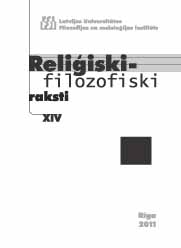Gustavs Menšings un viņa Latvijas periods
Gustav Mensching and his Latvia’s period
Author(s): Māra GrīnfeldeSubject(s): Philosophy
Published by: Latvijas Universitātes Filozofijas un socioloģijas institūts
Summary/Abstract: Phenomenology of religion has had a great impact on Latvian Lutheran theological thought in the first half of 20th century. Among the most influential figures one can name such prominent scholars as Rudolf Otto (1869-1937), Johann Friedrich Heiler (1892-1967), Gerardus van der Leeuw (1890-1950), William Brede Kristensen (1867-1953) and Nathan Söderblom (1866-1931), who place emphasis on the description of religious experiences trying to find in them the essence of religion. What is common to these scholars are attempts to define religion through human’s encounter with the holy or the numinous in her experience on the grounds of vast material provided by the history of religion. Phenomenology of religion as an approach to study of religion gained its importance and impact in Latvia due to Gustav Mensching (1901-1978), a prominent German theologian and scholar of religion, representative of comparative studies of religion. He was one among those scholars who established comparative studies of religion as an independent academic discipline and further developed phenomenology of religion. Mensching’s influence in Latvia is connected with his teaching duties at the Faculty of Theology at the University of Latvia during the period from 1927 to 1935. His influence and academic contribution was diverse. Working at the faculty he practically created a chair in general history of religion. In 1934 his book “The General Comperative History of Religions” was published in Latvian language. This book introduced Latvian reader with the ideas of comparative studies of religion and phenomenology of religion in a systematic manner. Mensching also had a great influence on a generation of theologians and researchers, among which one can name Alberts Freijs (1903-1968) and Haralds Biezais (1909-1995). Unfortunately, it was not meant for the phenomenology of religion to expand and develop in Latvia due to World War II and the occupation of Latvia in 1941. Revival of interest in the phenomenology of religion commenced only after Latvia restored its independence in 1991, especially, in the research of Nikandrs Gills (1945-2009). About 10 years after Mensching’s death his student Udo Tworuschka (1949), professor in studies of religion at the University of Jena started to gather Mensching’s scientific heritage that resulted in the foundation of Gustav Mensching’s arhive (Gustav-Mensching-Archiv). Since then research of Mensching’s life and scientific heritage has rapidly developed. In 2001 a conference was held at the University of Bonn in honour of Mensching’s centenary, during which a question was raised about status and future of research about Mensching. After Hamid Reza Yousefi’s initiative from 2002 to 2006 “Bausteine zur Mensching-Forschung”, 12 volume series was published, the aim of which was to give acomprehensive insight into Mensching’s life and academic endeavors, placing emphasis on his understanding of tolerance.
Journal: Religiski-filozofiski raksti
- Issue Year: XIV/2011
- Issue No: 1
- Page Range: 77-83
- Page Count: 7
- Language: Latvian

